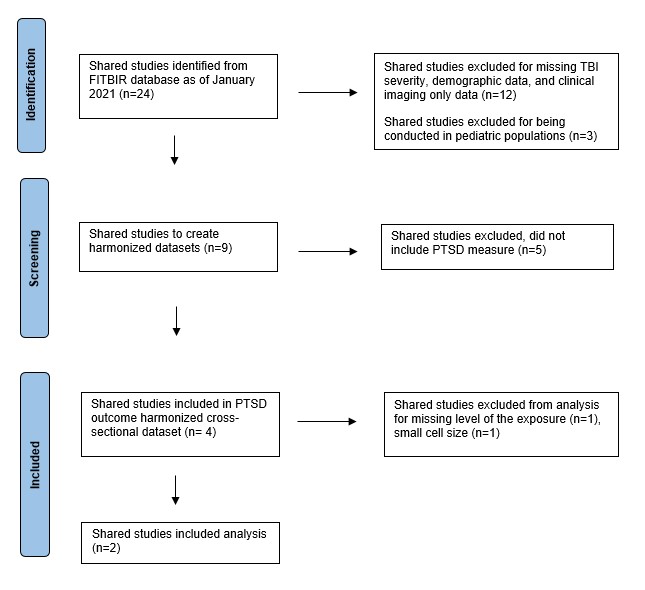A Proof-of-Concept Study Demonstrating How FITBIR Datasets Can be Harmonized to Examine Posttraumatic Stress Disorder-Traumatic Brain Injury Associations
DOI:
https://doi.org/10.35566/jbds/oneilKeywords:
Traumatic brain injury , Posttraumatic stress disorder , Evidence synthesis, Data repository, Meta-dataAbstract
Background: Although posttraumatic stress disorder (PTSD) is common following traumatic brain injury (TBI), the specific associations between these conditions is difficult to elucidate in part due to the diverse methodologies, small samples, and limited longitudinal data in the extant literature.
Objective: Conduct a proof-of-concept study demonstrating our ability to compile patient-level TBI data from shared studies in the Federal Interagency Traumatic Brain Injury Research (FITBIR) Informatics System to address these shortcomings and improve our understanding of TBI outcomes including the rates PTSD comorbidity.
Method: We searched the FITBIR database for shared studies reporting rates of probable PTSD among participants with no TBI, history of mild TBI, or history of moderate/severe TBI. We merged and harmonized data across the relevant studies and analyzed rates of probable PTSD across TBI history and severity categories.
Results: Four FITBIR studies with 2,312 participants included PTSD outcome data. The final sample for comparative analyses comprised 1,633 participants from two studies with TBI group comparison data. Approximately 79% had a history of mild TBI and 32-37% screened positive for probable PTSD. Participants with a history of mild TBI had 2.8 greater odds of probable PTSD compared to those without TBI (95% CI: 2.0, 3.7).
Conclusions: Only two FITBIR studies reported data examining PTSD outcomes for mild TBI as of January 2021. The analyses are consistent with prior literature, suggesting mild TBI is associated with higher rates of probable PTSD than no TBI. This study developed the methods, shared the harmonization and analysis code, and publicly shared the TBI and PTSD meta-dataset back to FITBIR for dissemination through their website, allowing future research teams to update these and other, related analyses as more studies are contributed to and shared via the FITBIR platform.









